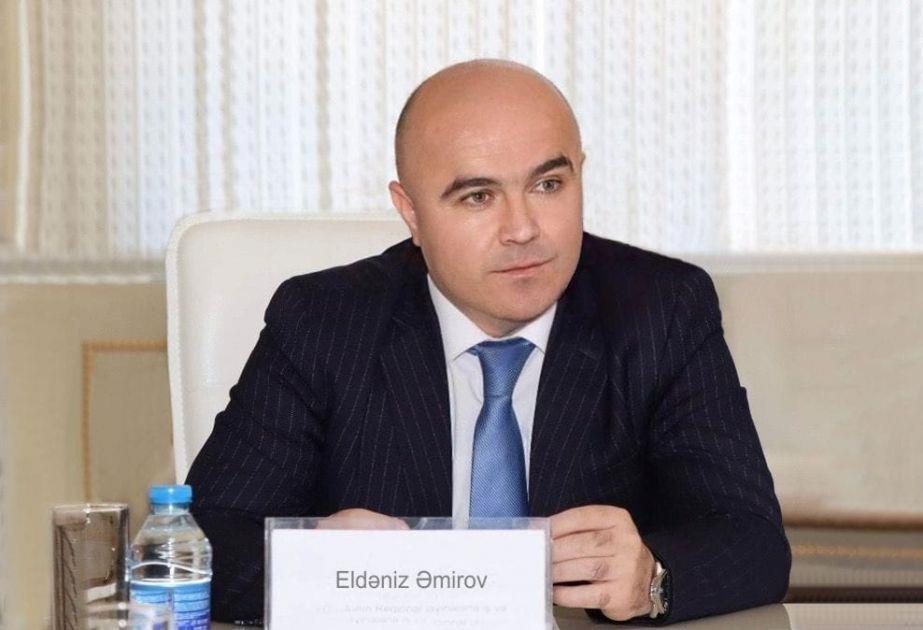(MENAFN- AzerNews)

Ulviyya Shahin Read more
The Baku-Tbilisi-Kars railway, one of the reasons for increasingthe geostrategic importance of Azerbaijan with a length of 826kilometers and connecting three countries, is realizing a number ofpriorities to achieve the set goals.
Emil Ahmadov, the head of the cargo transportation department atAzerbaijan Railways CJSC (ADY), announced that on May 20, a traincomprising 20 containers was dispatched to Georgia. He highlightedthat the 184-kilometer section of the Baku-Tbilisi-Kars (BTK)railway line, a crucial segment of the Middle Corridor, has beencompleted, enabling the commencement of cargo transportation alongthis route from May 20.
Ahmadov mentioned the plans to establish a joint venture betweenthe governments of Azerbaijan and Georgia to manage theBaku-Tbilisi-Kars railway, with efforts underway to develop thebusiness model of this venture in collaboration with aninternational consulting firm. The aim is to enhance cargo volumeand foster the development of the BTK line.
He outlined that the joint venture's primary responsibilitiesinclude executing all tasks related to the project, setting tariffsfor cargo transportation, managing cargo transportation operations,and addressing operational challenges comprehensively.
Additionally, Ahmadov highlighted ADY's efforts to facilitatecargo transportation between Central Asian and European nations viathe Middle Corridor through regular on-site meetings withentrepreneurs and close collaboration with railway administrationsand transport companies in these regions. Moreover, ADY hasestablished partnerships with cargo operators in Europe tofacilitate the transportation of goods from European countries toCentral Asia via the Middle Corridor.
Regarding transit cargo transportation by rail, Ahmadov noted asignificant increase in recent years, citing that in 2019, 3.8million tons of transit cargo were transported, reaching 6.8million tons in 2023. Furthermore, he emphasized a 14 percentincrease in transit cargo transportation volume in January-April ofthe current year compared to the same period last year, the first quarter of the current year witnessed a 10percent rise in transit cargo transportation along the East-Westcorridor, including the BTK route.
We sought an expert opinion to provide answers to questionsabout the importance of the 184-kilometer segment of the railwayand its benefits, as well as the reasons for the increase in cargovolume in recent years. While answering questions, the expert alsotouched on specific initiatives and strategies to attract morecargo operators and increase the utilization of rail transport forfreight between European countries and Central Asia via the MiddleCorridor.
Speaking to Azernews Azerbaijani economistEldeniz Amirova said that while discussing the prospects andpotential of the Baku-Tbilisi-Kars railway, emphasized theimportance of briefly reviewing its history for a more accurateunderstanding.

“Although the first railway in Azerbaijan was laid in the late19th century, it underwent a long development path and finallyreached its current state. Specifically, when we look at theBaku-Tbilisi-Kars line, after the conflict between Azerbaijan andArmenia in 1993, the Qars-Gyumri-Tbilisi railway was temporarilydisconnected. Subsequently, the construction of theBaku-Tbilisi-Kars railway was needed as an alternative route, in 2005, a trilateral agreement was signed betweenAzerbaijan, Turkey, and Georgia regarding the railway line, its implementation was delayed for a long time. Thereasons for this were pressures faced by Azerbaijan. The Westwanted this railway to pass through Armenian territory. However,Azerbaijan insisted vehemently on implementing this projectunilaterally without involving Armenia. The conflict between Russiaand Georgia also hindered the completion of this project for awhile. The implementation period was extended several times overdifferent periods. The opening of the said railway took place in2017.”
According to him, it was impossible to imagine theBaku-Tbilisi-Kars line without the Baku International Trade Port;their infrastructures were being created and developedsynchronously. Therefore, the opening of the Baku-Tbilisi-Kars linedirectly started from the Baku International Trade Port inSeptember 2017.
When it comes to the importance of completing the 184-kilometersection of the Baku-Tbilisi-Kars railway line, the expert notesthat it is not possible to reliably transport large volumes ofcargo with an outdated railway line.
“Therefore, it is imperative to create an infrastructure thatresponds to modern needs, and this infrastructure should be createdalong the entire railway corridor to ensure more reliable supplies the statistics for the period from 2017 to 2022, afterthe corridor became operational, it should be noted that duringthat period, 1,347,585 tons of cargo were transported. Looking atthe potential, we see that this is a very small figure. Here, it isenvisaged to transport 5 million tons of cargo in the first phaseand up to 17 million tons in the subsequent phase.”
E. Amirov believes that this will allow for a further increasein the volume of transported goods through unilateral enhancementof technical capabilities, elevation of economic cooperation, andimplementation of new technological, innovative approaches in thelong term.
“The Russia-Ukraine war further conditioned the increases inthis direction, as the majority of goods passing through thenorthern part of the Caspian Sea and Russian territory were givenpreference by logistics companies to transit through the centralroute, which further increased the relevance of theBaku-Tbilisi-Kars line,” he added.
When it comes to the initiative related to the expansion of theMiddle Corridor, an economist stated that the completion of theaforementioned 184-kilometer section repair, preparation of a newconcept for the Middle Corridor, and formulation of a strategy forproviding unified customs services all contribute to enhancing thepotential of this corridor in the long run.
“The creation of a joint institution for the management of theBaku-Tbilisi-Kars railway line will enable proper coordination. Itwill provide an opportunity for accurate analysis of existingproblems, allowing for more agile responses and quicker resolutionof identified issues within a shorter period. Additionally,considering the railway line passes through various countries, itwill facilitate the harmonization of the legal framework in aunified direction. Most importantly, it will contribute to ensuringtransparency,” the expert concluded.
MENAFN24052024000195011045ID1108252792
Legal Disclaimer:
MENAFN provides the information “as is” without warranty of any kind. We do not accept any responsibility or liability for the accuracy, content, images, videos, licenses, completeness, legality, or reliability of the information contained in this article. If you have any complaints or copyright issues related to this article, kindly contact the provider above.